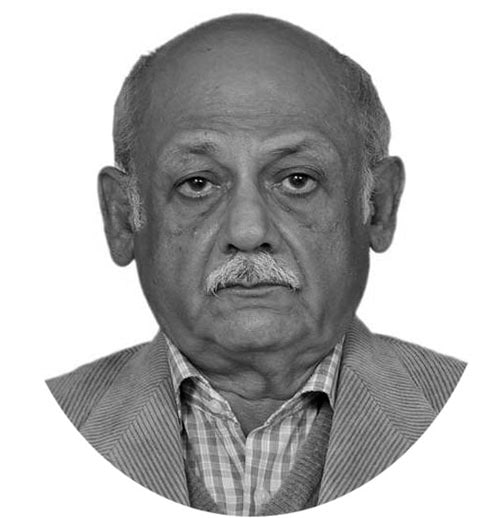Dr A Q Khan, a national hero
IT was in January 1974 that Prime Minister Z A Bhutto convened a meeting of nuclear scientists, engineers and technicians in a remote rest house of the irrigation department in Multan.
Pakistani nuclear scientists and engineers had been invited from all over the world to this meeting arranged by the Pakistan Atomic Energy Commission headed by Dr Munir Ahmed.
Bhutto stood up to address the gathering and without mincing words in his indomitable confident style said “India is now a nuclear power. We cannot sit idle and accept the domination of our arch enemy. We will eat grass but we must develop our nuclear weapons.
Is there anybody here who can develop an atomic bomb without the facility of a reprocessing plant?” The audience of eminent scientists and engineers, some of the finest minds in nuclear technology were stunned.
There was pin drop silence. Nobody spoke. Bhutto waited impatiently staring expectantly at the gathering and waiting for some response.
Suddenly a tall slim young man dressed in a safari suit sitting at the back of the room stood up and said “Yes sir I can do it” This young man was Dr Abdul Qadeer Khan, the father of the atomic weapons programme of Pakistan. Bhutto immediately asked him to come to Islamabad and the rest is history.
The Pakistan Atomic energy Commission headed by Munir Ahmed Khan had been working on the plutonium methods to develop nuclear weapons and depended on raw material obtained from the Karachi Nuclear power project but could get nowhere due to nuclear export controls and a very tight watch by the UN and other western nuclear powers that were adamant to prevent the spread of nuclear technology.
Dr Qadeer returned to Holland where he was working with the URENCO uranium enrichment facility resigned from his lucrative job packed his bags and came back to Pakistan with his wife and two small daughters.
In Pakistan he was given complete autonomy to start his program and a new department was created called Special Works Organization for building the infrastructure in Kahuta to house the facilities urgently required for the weapons programme.
By late 1975 A Q Khan fired by immense zeal and love for his country had launched the program to develop a uranium enrichment program for weapons grade uranium.
He had brought with him the designs and technical know-how of the Centrifuge methods of uranium enrichment. At that time nobody in Pakistan had the faintest idea of this technology and very few in the world knew about it.
Pakistani atomic bomb could not have been possible without the dedication hard work and superb technical knowledge of Dr A Q Khan.
At the time of the Pakistani Atomic explosions in 1998 a very ugly and shameful controversy was ignited by some vested interests that Dr. A.Q. Khan had nothing to do with this achievement and he is only a metallurgist with no idea of nuclear weapons. This was saying like making an omelet without eggs.
Dr A Q Khan, son of the soil, patriot and one of the greatest benefactors of this country was born in the north Indian town of Bhopal in 1936 and migrated with his middle class educated family to Karachi in 1952.
He studied at the St Antony’s high school, DJ Science College where he had physics and mathematics and then earned a BSc Degree in Metallurgy from the University of Karachi in 1956.
From 1956 to 1959 he worked as an Inspector of Weights and Measures. He then applied for a scholarship and got a chance to study in Germany at the Technical University in West Berlin where he excelled in Metallurgy and then switched to the Delft University of Technology in the Netherlands and obtained an engineer’s degree in materials technology and then joined a PhD program in metallurgical engineering at the Katholieke University Leuven in Belgium. He successfully defended his thesis and graduated with DEng in metallurgical engineering in 1972.
Apart from his yeoman services to the nuclear weapons programme, Dr Khan was also a key figure in the establishment of several engineering universities in Pakistan. He set up a Metallurgy and Material Science Institute in Ghulam Ishaq Khan Institute of Engineering Sciences and Technology.
The place, where Khan served as both Executive Member and Director, has been named as Dr A Q Khan Department of Metallurgical Engineering and Material Sciences.
Another school, Dr A Q Khan Institute of Biotechnology and Genetic Engineering at Karachi University, has also been named in his honour. Khan thus played a vital role in bringing metallurgical engineering courses to various universities of Pakistan.
After the 11 September 2001 attacks in the USA Dr A Q Khan came under intense scrutiny of the United States who believed that Dr Khan was giving nuclear weapons technology to North Korea to get ballistic missile technology in exchange. It was also alleged that he had sold nuclear technology to Iran and Libya.
He was removed from all government positions and placed under house arrest by the Pervez Musharraf government. The hero fell from grace and an attempt was made to humiliate and disgrace this national hero.
Whatever the critics and detractors of Dr A Q Khan may say his name will be written in golden words in our history and he will always live in the hearts and minds of the people as one of our greatest heroes.
—The writer is Professor of History, based in Islamabad.










